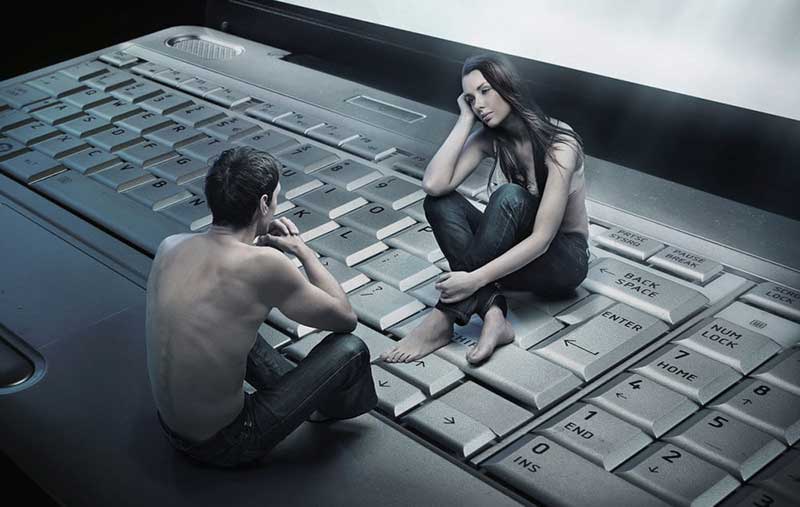- Online dating theoretically enables us to pick out the best from the rest
- Wearables help first-date conversation with prompts based on data
- Human-on-machine lovin’, really?
- Behold the future of inter-species family dynamics
- What’s love got to do with it?
Humans are social beings. We need the company of others and we all dream of finding that perfect soul mate, someone to be with us through thick and thin, one who shares our hopes and passions. Today, we meet people in the virtual world first, on social networks and dating sites. We interact with people from other cities or even countries, who live thousands of kilometers away. We even begin relationships with them, long before we ever meet them face-to-face. The future of dating and relationships will see us increasingly looking to technology to help us along.
Online dating enables us to pick out the best from the rest
According to a recent analysis of wedding announcements published in daily newspapers in the last 36 years, meeting people on the Internet was one of the most common approaches – second to meeting through mutual friends or at work or school. The incredible success of smartphone applications like Tinder will make that number even higher in the future, probably even claiming the top spot. Some people are still skeptical about online dating and they certainly make some valid points. Firstly, we really have no way of knowing whether the person on the other end is telling the truth. Is he really a doctor or a lawyer? Is that even his photo? Is it a current photo? Assuming the information is genuine, it does give us the opportunity to make better decisions about whom to date. We are able to select only those who share the same interests and passions. Also, there’s a lot to be said for getting to know someone online before meeting in person. After all, it may be the physical appearance that initially draws us to a person, but it’s their personality that makes us stick around.

Wearables help first-date conversation with prompts based on data
Besides dating apps, other technologies like virtual and augmented reality could also have a huge impact on the way we date in the future. With virtual reality, it wouldn’t matter if the other person was on the other end of the world, the technology would make it feel as if they were right there in the room with us. Virtual reality, combined with haptic technology, even allows us the experience of physical stimulation from a distance. And as we keep building faster and faster methods of transportation, distance may become almost meaningless in the future. Furthermore, advances in machine learning and artificial intelligence would enable us to have small wearable computers, capable of analysing the scenes happening in front of us, reading our date’s facial expressions and body language and offering us advice (through an earpiece or a headset) on how to proceed, based on that data. Assistance provided by artificial intelligence could eliminate the uncomfortable silences that plague many dates, especially in the beginning. According to some scientists, our DNA actually holds the key to finding the perfect match. And as the costs of DNA sequencing are decreasing every year, more and more people are gradually warming up to the idea of using their DNA to find love.
Human-on-machine lovin’, really?
And who says our soul mate, our partner, has to be human? Why can’t it be a robot? Man-machine relationships have been a hot topic in science fiction for decades, from Hal 9000 in A Space Odyssey to more recent examples like Her and Ex Machina. We are already addicted to our mobile devices and we sometimes even assign certain human characteristics to machines. As they become more advanced and more like us, in appearance as well as in behaviour, it’s not a huge leap from there to love and romance. We might even say that it’s certain to happen, once the technology is advanced enough.
A relationship with a machine could certainly have some advantages, such as the ability to make them look and behave exactly the way we want. We could choose the colour of their skin, hair, eyes, their height and weight and we could include any type of personality into their programming. We could make them talk about things we find interesting, laugh at our jokes, listen to our problems and never complain or fight with us. They could learn from past behaviour what makes us happy and act accordingly. We would have the freedom to be ourselves, without having to change and adapt to someone else’s idea of a perfect partner. Some people might even prefer to be with a robot than with a real human.
Behold the future of inter-species love dynamics
With their current levels of sophistication, machines are becoming increasingly human-like. Well, at least in the first five seconds. Beating the Turing test is one thing, but replicating human appearance and behaviour enough to fool someone into thinking they are dealing with a real person is something completely different. As we are increasingly open-minded about sexuality and relationships, the possibility of human-robot relationships in the future is however not unlikely. We may even be able to marry a machine or raise a family with one. Of course, in those cases we would need to involve surrogates, sperm donors or consider adoption. We may even have to come up with laws to define such relationships. And there will be certain ethical matters to consider as well, such as which rights these human-like machines should have.
The future of dating and relationships – what’s love got to do with it?
The main challenge around human-machine relationships is that a robot could never really love you back. It may appear that it can, but everything the machine says or does is decided by an algorithm. It is a calculated, not an emotional response. But what if it gives you everything you need? What if it never leaves you, never judges you… if it’s everything you ever hoped for and more, would it make a difference?
Another problem with this scenario is that people are already presented with a lot of choice and adding machines to the mix could create further confusion. It could also prove counter-productive, by resulting in even more lonely people, as some people may actually leave their human partners to be in a robot-‘relationship’ without any pressure of expectations.
There are also those fearing a possible doomsday scenario, in which artificial intelligence takes control of our world, similar to the Skynet computer from the Terminator movies. This is a very real possibility, and we need to make sure to take the steps necessary to prevent that from happening. Finding ways to include the notion of love, compassion and other human emotions into their programming would go a long way towards achieving that goal. Of course, in order to make it seem realistic, we would have to program some negative emotions as well, like fear, anger or jealousy.
Even taking all that into account, it would still be incredibly difficult to imitate every aspect of human behaviour, because even we don’t fully understand yet what it is that makes us tick, what exactly makes two people fall in love. In the end, when it does become a reality one day, the decision whether to have a relationship with a machine or not will come down to personal preference.
Share via:


